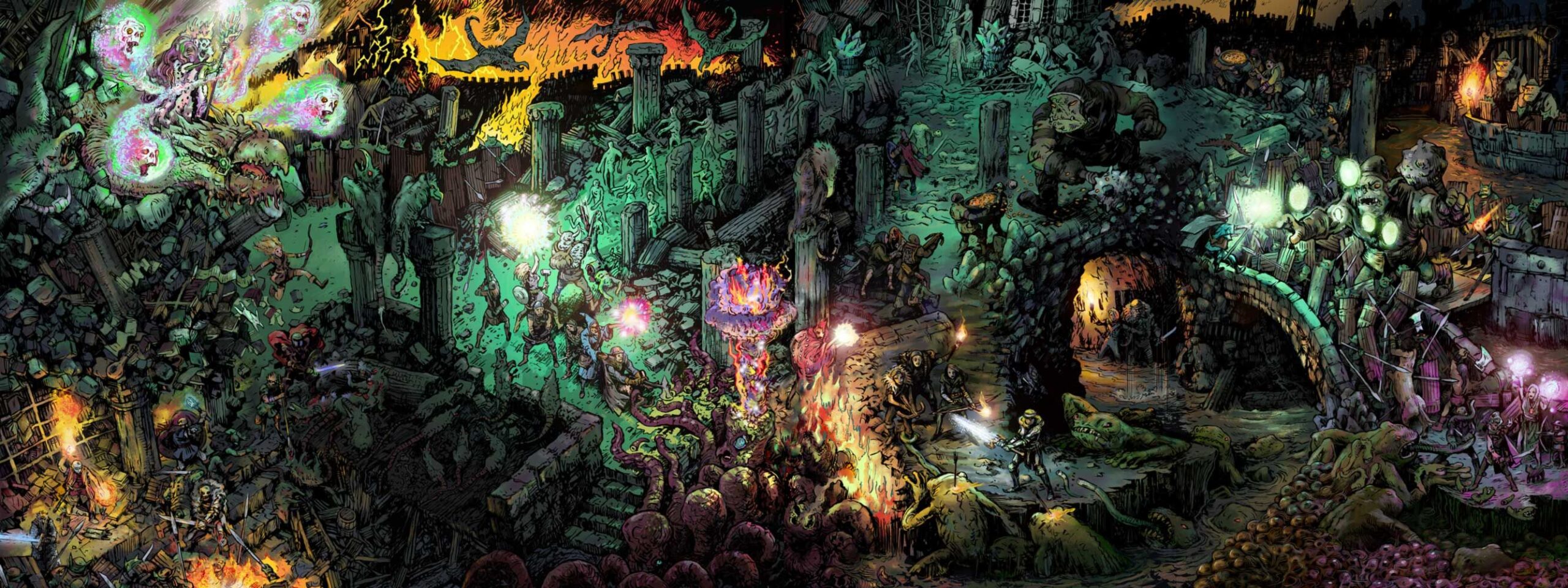After running close to 100 5e sessions, I’m ready to move on. It was fun and got me back into the hobby in a major way. But I have grown increasingly frustrated with 5e, and its attempt to carefully simulate everything fantastic. I find battles to be tedious and boring. The 5e Player Handbook is over 210,000 words, and I have players who’ve read it all and want to integrate from the other books and various Unearthed Arcana. At this point I own the PHB, MM, DMG, as well as Xanathar’s Guide to Everything, Wayfinder’s Guide to Eberron, and Volo’s Guide to Monsters. To think I started with an open table that I wanted to keep to the free Basic Rules! (That purist vision didn’t last one session.)
Originally I bought a copy of Dungeon World to learn how to be a better 5e DM, as Sly Flourish has raved about its tips, and I wanted to integrate Fronts into my prep. But the more I read about the system, the more I wanted to run games in it.
This quote from “What are the major innovations in Dungeon World compared to D&D 3.5/Pf/4e?” was the kicker for me:
In DW there’s no clear distinction between in-combat and out-of-combat. The rules you use are the same whether you’re trying to strike an enemy or to climb a dangerous cliff or to convince the city guard of your innocence. Moves also involve failure and partial success, and move the fiction forward, while failing a to hit roll [in D&D] has no consequences outside of the current combat encounter or situation.
Combat in 5e really is a minigame, entered by a ritual (roll for initiative) and exited with a plaintive cry, “Are we out of combat now?” (Does the DM have a last trick up their sleeve?!) Honestly, the shift from an in-person group to playing virtually through Roll 20 was part of my exhaustion with 5e; I set up one session with battle maps and nice images of all the combatants, and after 90 minutes of that realized I never wanted to do it again.
Also from that article:
Why Dungeon World instead of another D&D?
The common expression I’ve heard (and myself experienced) about problem Dungeon World solves over other D&Ds is that it has no downtime. One of the major problems of D&D is that a lot of table time is spent waiting for your turn, finessing minor details of a rule or build, doing stuff in-game that the players aren’t interested, or the dreaded “nothing happens” when a skill roll is failed.
Dungeon World manages to eliminate all the dead time. Nobody is waiting during combat: they can act whenever there is an opening. There are no mechanics that need fiddling with: you just play, and decide when a move triggers. Handling time for moves isn’t a step outside of the game: the content of the move keeps you engaged and (for those who do it) immersed in your character’s situation. The rules the GM must follow ensure that the adventure is always constantly pulled in the same direction that the players’ attention is pointed. A miss on a roll always leads to a new interesting event (often bad, sometimes good, always adding nuance to the adventure).
This is paraphrase of a quote that I’ve commonly seen: “Dungeon World feels like what you imagined D&D was when you first heard of it.”
It accomplishes that by eliminating the need to talk about anything that isn’t action happening right now.
The core mechanic of Dungeon World is to roll 2d6 and possibly add a relevant bonus or penalty (e.g., DEX when volleying).
- A roll of 10 or higher is a complete success.
- A roll of 7 through 9 is a partial success, with the player often choosing which part they succeed at, and then the GM relaying an ensuing difficulty.
- A roll of 6 or lower results in negative consequences.
Players don’t simply fail at what they were doing; bad things happen. A thief doesn’t get to attempt to pick a lock again and again until success. Perhaps the lock breaks, a trap fires, or a monster enters.
Dungeon World also checks off my other requirements:
- Narrative driven rather than simulationist. Nothing typifies this more than the quantum Adventuring Gear: “A collection of useful mundane items such as chalk, poles, spikes, ropes, etc. When you rummage through your adventuring gear for some useful mundane item, and you have a remaining use, you find what you need and mark off a use.” (You can use it 5 times.)
- Rules complexity on the GM side, not the player side.
- Embraces the D&D heritage (it started as a mashup of Apocalypse World and AD&D).
- Open source, so that it can hacked, edited, curated, as desired.
- Excellent Roll 20 support, including the complete rules.
Not a Roll 20 user? Check out the free DW Gazetteer.
One thing this year has taught me is that silence signals acceptance of the status quo. To be clear, GMs should always seek Consent in Gaming, misogynists should be shamed and shunned, and racism must be opposed through anti-racism. The game contains some tired racist tropes typical of the genre that should be avoided. One co-author of DW earlier this year staged a virtual rape in gameplay in a public roleplaying setting and has withdrawn from the industry. The other removed the game from his Twitter bio. For all practical purposes, Dungeon World has been abandoned by its creators and is championed by a fervent online community instead. The community has a rich collection of supplemental material but it is clear that we must continue to improve it and better strive for justice and equity.

